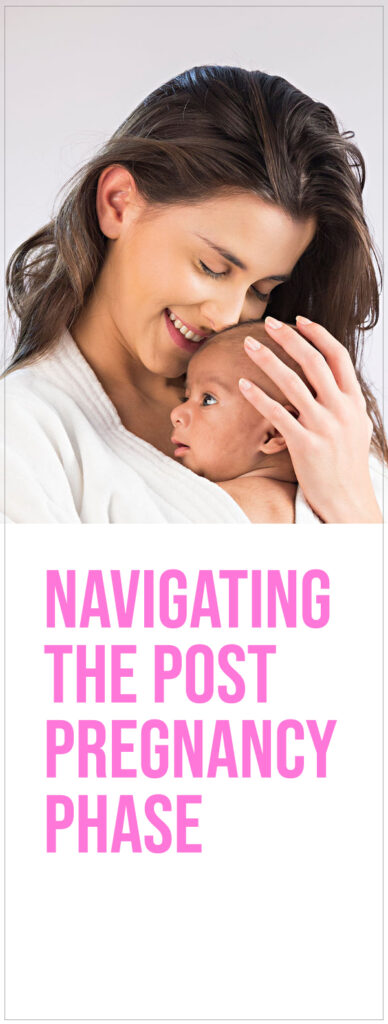Natural Pregnancy
November 8, 2024Baby Care 0-12 Months
November 8, 2024Post Pregnancy Care

Navigating the Post-Pregnancy Phase: A Comprehensive Guide
The post-pregnancy phase, also known as the postpartum period, marks a time of transformation, adjustment, and nurturing. As you embark on this remarkable journey,understanding the nuances of post-pregnancy care is essential for both your well-being and that of your newborn. In this blog post, we’ll delve into the various facets of the postpregnancy phase, offering insights into what to do, what to eat, the lifestyle to embrace, and the changes you can expect during this transformative time.
Part 1: Embracing Post-Pregnancy Care
Recovery and Self-Care
After the exhilarating experience of childbirth, your body requires time to heal. Prioritizing self-care is crucial during this period.
Rest and Sleep
Adequate rest and sleep support your body’s healing process. While sleep patterns may be disrupted due to newborn care, aim to nap when your baby does.
Hydration
Staying hydrated is essential for your recovery, especially if you’re breastfeeding. Keep a water bottle handy to ensure consistent hydration.
Pelvic Floor Exercises
Gentle pelvic floor exercises help strengthen your muscles and aid in postpartum recovery. Consult your healthcare provider for guidance.
Part 2: Nourishing Your Body Post-Pregnancy
Balancing Nutrient Intake
Nutrition plays a pivotal role in post-pregnancy recovery and supporting your body’s needs during breastfeeding.
Focusing on Nutrient Density
Opt for nutrient-dense foods that provide essential vitamins and minerals. Include lean proteins, whole grains, fresh fruits, and vegetables in your meals.
Iron-Rich Foods
If you experienced blood loss during childbirth, incorporating iron-rich foods like lean meats, beans, lentils, and leafy greens can help replenish your iron stores.
Omega-3 Fatty Acids
Continue consuming foods rich in omega-3 fatty acids, which support brain health and development for both you and your baby.
Hydration
Adequate hydration is essential for milk production if you’re breastfeeding. Aim to drink water regularly throughout the day.
Part 3: Crafting a Post-Pregnancy Lifestyle
Embracing Balance
The postpartum period calls for a delicate balance between self-care, newborn care, and other responsibilities.
POST PREGNANCY CARE
Establishing Routine
Creating a flexible daily routine helps you manage your time and responsibilities while ensuring you prioritize self-care.
Seeking Support
Don’t hesitate to ask for help from family and friends. Having a support system can ease the transition into post-pregnancy life.
Gentle Exercise
Engaging in gentle exercise, such as walking or postnatal yoga, can boost your mood, energy levels, and overall well-being.
Part 4: Understanding Post-Pregnancy Changes
Physical Changes
The post-pregnancy period brings about various physical changes as your body adjusts to its pre-pregnancy state.
Uterine Contractions
After childbirth, your uterus undergoes contractions to return to its original size. These contractions, known as afterpains, can be uncomfortable.
Vaginal Bleeding
Postpartum bleeding, known as lochia, is a natural process that occurs as your body sheds the uterine lining. The bleeding gradually decreases over time.
Breast Changes
If you’re breastfeeding, your breasts undergo changes to produce milk. Engorgement, nipple tenderness, and leakage are common.
Hormonal Shifts
Hormone levels that surged during pregnancy begin to normalize. This process can contribute to mood changes and hair loss.
Emotional Well-Being
The emotional aspect of post-pregnancy is equally important.
Baby Blues
It’s common to experience mood swings, tearfulness, and feelings of overwhelm. These emotions usually subside within a few weeks.
Postpartum Depression
If feelings of sadness, hopelessness, or anxiety persist, seek support from healthcare professionals.
Conclusion: Nurturing Yourself and Your Newborn
The post-pregnancy phase is a unique period marked by physical changes, emotional adjustments, and the blossoming of a new relationship with your newborn. By embracing self-care, nurturing your body with balanced nutrition, crafting a supportive lifestyle, and seeking understanding of the changes you’re experiencing, you are setting the foundation for a healthy postpartum journey.
Remember that every journey is unique, and it’s okay to seek guidance and support when needed. As you navigate this transformative phase, know that you’re embarking on a new chapter filled with growth, love, and the joy of nurturing both yourself and your precious baby

